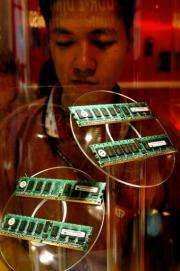Taiwan's chip makers still face dangers: analysts

Taiwan's chip makers, powerful drivers of growth on the island, may have survived their worst crisis ever, but lacklustre sales and new rivals still make these risky times.
The local semiconductor industry, the fourth-largest in the world, saw sales soar by a steep margin in the second quarter, but is set to become markedly less feverish in the third quarter, analysts argued.
"The slowing pace of growth shows the global recovery may not be as fast as previously anticipated," said Mars Hsu, a Taipei-based technology analyst with Grand Cathay Securities.
In the three months to June, combined revenues of the island's chip makers soared 69.2 percent from the previous quarter to 136.2 billion Taiwan dollars (4.18 billion US dollars), the Taiwan Semiconductor Industry Association said.
This followed a record 33.7 percent quarter-on-quarter drop in the three months to March for an industry that, more than any other, helped give Taiwan its reputation as a high-tech island.
The pickup in sales in the second quarter was largely due to unique factors, such as a need among clients to rebuild inventories after the immediate shocks of the worst crisis in decades.
"Clients found their inventories were low as a result of the uncertainty that gripped the market after the crisis last year," said Peng Mao-jung, an analyst of the quasi-official Industrial Technology Research Institute.
Contributing to the fast pace of growth in the second quarter was also another one-off factor -- a rush of orders from the mainland after the Chinese government adopted massive stimulus spending to lift its flagging economy.
One-offs do not last long, and analysts suspect that the industry may be losing momentum with Peng forecasting growth of just 17 percent in the third quarter from the second.
The 17-percent growth forecast is shared by United Microelectronics Corp., the world's number two contract microchip maker.
The company has said its demand in the third quarter, a typically busy period of the year for the chip industry, has slowed because of rising economic uncertainties.
The upshot is that the island's chip output will reach 541.5 billion Taiwan dollars this year, marking a 17.2 percent fall from the previous year.
"Basically, despite the strong rebound in the recent months, this is not going to be a good year for the local semiconductor industry," Peng said.
On top of this, the island's chip manufacturers are now bracing themselves for a challenge from an unusual quarter -- the Middle East.
Abu Dhabi investment firm Advanced Technology Investment Company (ATIC) has offered to buy Singapore's Chartered Semiconductor for 3.9 billion US dollars.
ATIC is also the main shareholder in Globalfoundries, a joint venture with US firm Advanced Micro Devices (AMD).
Chartered Semiconductor and Globalfoundries together account for around 13 percent of the global market in terms of foundry services.
Although this is still dwarfed by the 49 percent held by Taiwan Semiconductor Manufacturing Co., it does reflect tectonic shifts in the global chip industry facilitated by the financial crisis, observers argued.
"The global recession has opened up a number of opportunities for the strong to get stronger," said Len Jelinek, a chief analyst at the iSuppli Corp., a California-based research and consultancy firm.
"(This is) causing a dramatic shift in who will be the leaders in the pure-play foundry market for years to come," he said.
(c) 2009 AFP





















